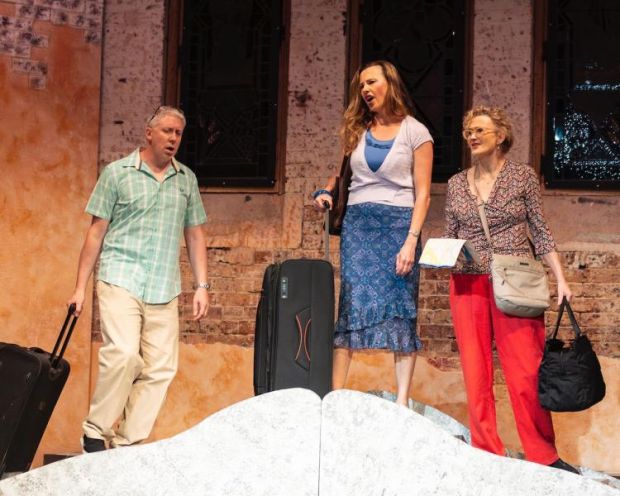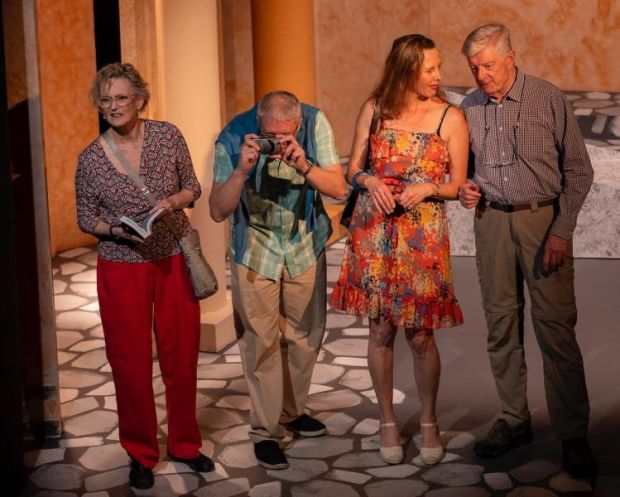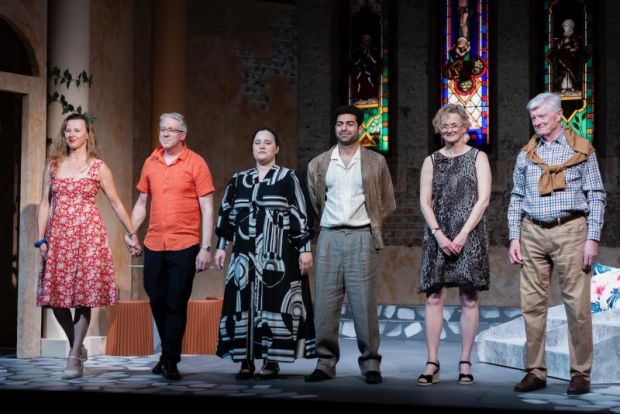By Roger Hall. Director Tui Clark. Genesian Theatre. 14 Oct – 4 Nov, 2023
Reviewed : 15 October, 2023

The ‘four flat whites’ in the title are two retired couples, recently acquainted, who are, inadvertently, travelling through Italy together. Written by prolific New Zealand playwright Roger Hall, the journey begins with a game of bridge in New Zealand and ends in a balmy night in Tuscany. What happens in between – disagreements, compromises, lost credit cards, finances and fun – is cleverly manipulated by Hall and the very identifiable characters he has created.
But … it’s not easy to transport a theatre audience from an apartment in Aotearoa to a pensione in Venice, or take them on a road trip to Rome and Tuscany. Yet … director Tui Clark has achieved this skilfully, by concentrating on the characters and the clever script –and using the original ecclesiastical architecture of the Genesian theatre to suggest the historical romance Italy.
The stage is open, the stained-glass windows and brick walls of the old church building suggesting past eras. Tui and scenic designer Gregory George have used the full width of the stage, adding archways and columns in pastel shades that suggest age, grandeur, and space – and provide a backdrop for Cian Byrne’s thoughtful and creative lighting. A table, four stools and a cunningly designed set of steps manipulated by two busy stage crew are the only props.

The scenario is introduced by Adrian, a retired university librarian, who acts as a sort of narrator, introducing the other characters and chronicling the stages of the journey. Hall has used this device to move the story smoothly – and to add humour via Adrian’s witty asides to the audience.
Stewart-Hunter carries this role with professional aplomb, establishing a warm, on-going relationship with the audience through his excellent understanding of and connection to the rhythm and timbre of Hall’s writing – especially the asides which he delivers with perfect timing and wry expressions. The Adrian he portrays is affable, intelligent and socially perceptive but just a little diffident and reserved in the face of his wife Alison’s parsimony and seeming lack of affection.
Alison, also a retired librarian, is played intuitively by Penny Church. Church portrays a reticence in Alison that infers a want of empathy and trust – the reason for which eventually emerges. She makes Alison edgy, unable to relax, prickly and controlling – yet still allows the seasoned travellers in the audience to sympathise with her enthusiasm and knowledge. Church is a perspicacious actor who uses the inferences in the dialogue to define the different dimensions of Alison’s character – especially her fragility.

Harry and Judy are the antithesis of Adrian and Alison. Harry, a divorcee, has retired early from his plumbing business and married Judy, his slightly younger secretary. “I am not a trophy wife” she announces sassily across the bridge table. Still in a “honeymoon” glow, they are suggestively affectionate and a little ‘indelicate’ in Alison’s eyes.
Christopher Pali plays Harry. Wealthy, a seasoned traveller and conservative voter, Harry is very self-assured, and Pali finds all of that in his performance, as well as a little arrogance that irks both Adrian and Alison – but is often ‘charmed’ away by Judy.
Judy is a bit of an enigma. She seems a little brazen and flirtatious – but she is also observant and compassionate, and Karen Pattison manages to portray all of that in a very energetic and engaging performance. She is mindful of the tension between the other couple, is sensitive to Adrian’s unhappiness and Alison’s touchiness – and finds ways to ease the tension and raise the ‘fun barometer” of the holiday, despite lost bookings, cramped cars and an insistent gondolier.
The nine Italians they meet along the way are played by Kimberlea Smith and Imran Khaliqi. Smith moves easily from petulant pensione proprietor to bored barista, and from keen dress salesperson to elegant English Italian Countess.

Khaliqi has fun playing a waiter, a persuasive gondolier, a pushy gladiator and an elegant Italian count. That he makes such an impact in each of these roles gives credence to Stanislavski’s oft’ repeated comment about “small parts” and “small actors”.
Tui Clark’s canny and discerning direction takes the cast through a range of funny experiences … and some past grief, that is, happily, resolved. She ensures the depth and dimension that Roger Hall builds in the dialogue is strong and that the understanding between the characters grows as their real personalities are revealed.
This is an elegant production that relies on the actors, their director and a clever playwright to transport the audience into situations many of them recognise and with which they will identify.
Also published in Stage Whispers magazine